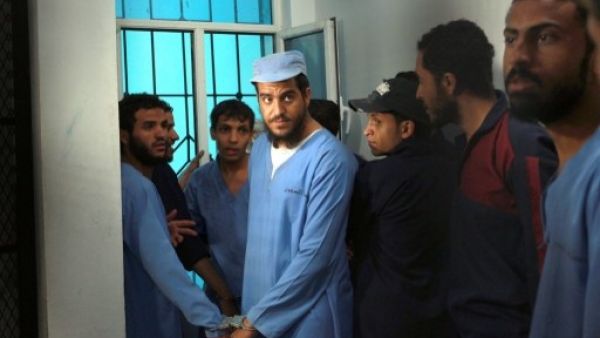The defendants are charged with “being part of an armed group belonging to Al-Qaeda to carry out criminal acts targeting members of the public authorities and foreigners.”
Six of the defendants had placed an “explosive device on the Sittin road through which the president’s convoy regularly passes ... aiming to kill the president and his companions,” according to charges published by the official Saba news agency.
On May 12 the Defense Ministry website 26sep.net reported that security forces had dismantled an explosive device that was found near a bridge in the city center.
The device was made up of 7 kilograms of C-3 explosives connected to a timer and placed under the bridge by an unknown person who was travelling by taxi, the ministry said at the time.
Eight of the defendants appeared in court, while the ninth, identified as Abdel-Rahman al-Dhubaibi – a local Al-Qaeda chief in the south of Sanaa – remains at large, according to an AFP correspondent at the hearing.
One of the eight defendants who appeared in court Sunday was released for lack of evidence, and presiding Judge Hilal Mahfal set the next hearing for Nov. 24.
On Sept. 15, the same court specializing in terrorism cases jailed three Al-Qaeda militants for between one and seven years after convicting them of plotting to assassinate Hadi and the American ambassador.
A fourth defendant held on similar charges was freed based on time already served in prison.
Yemen is the ancestral home of Al-Qaeda founder Osama bin Laden and home base of Al-Qaeda in the Arabian Peninsula, which the US views as the network’s most dangerous franchise.
AQAP took advantage of a decline in central government control during a 2011 uprising – which eventually forced President Ali Abdullah Saleh from power – to seize large swathes of territory across the south.
The militants were driven back in June 2012 and the group has been weakened by US drone strikes. But AQAP remains active in southern and eastern Yemen, and regularly carries out hit-and-run attacks on security forces.
Clashes have killed at least 100 people since they broke out on Oct. 30 when Houthis, who control much of Saada province on the border with Saudi Arabia, accused Salafist rivals in the town of Damaj of recruiting thousands of foreign fighters to prepare to attack them.
The Salafists say the foreigners are students seeking to deepen their knowledge of Islam.
“The confrontations have ended in Saada and the cease-fire took effect half an hour ago,” Yehia Abuesbaa, head of a presidential committee tasked with ending the fighting, told Reuters by telephone from Damaj.
An attempt to broker a cease-fire last week collapsed less than a day after it was declared, but the lull in fighting enabled Red Cross officials to evacuate nearly 70 people from Damaj.









